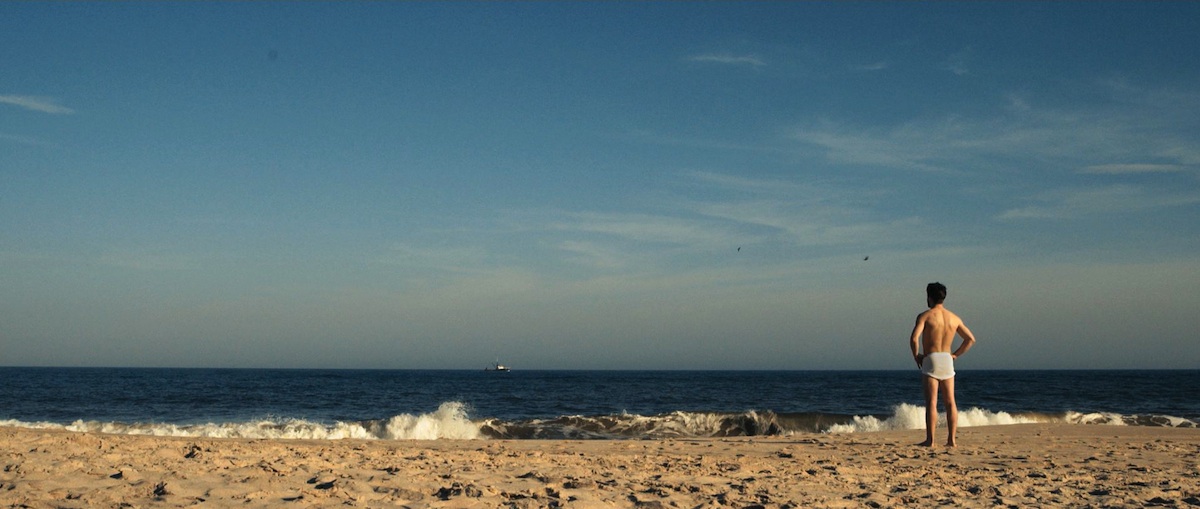Andrew Gilchrist’s Story from the Sea

ABOVE: ANDREW GILCHRIST IN HIS FILM SEA PIG
When Brooklyn-based filmmaker Andrew Gilchrist asks you how you are, he asks how the hell you are. There is, in fact, a “hell” in most of his inquiries: how the hell, who the hell, etc. He grew up in Kansas. His middle name is Guy. The lack of pretension in Gilchrist’s demeanor is a bit like a Marlon Brando character in person—hard and soft at the same time. This is surprising, perhaps, given that the bulk of his career has been spent working as an actor in (what some would qualify as “fairly pretentious”) avant-garde theater. He is currently touring in the theatrical collaboration between Robert Wilson and Marina AbramoviÄ?, The Life and Death of Marina AbramoviÄ?; and he appeared in artist Laurie Anderson’s 2011 film, The Gray Rabbit.
In his own work, Gilchrist fuses the lurid aesthetics and narrative manipulations of the avant-garde with relatable characters, whose dark, comedic dialogue calls to mind Tarantino’s similarly obsessive decomposing of the nuance of the mundane. His new film, Sea Pig, which recently won Best Short Film at both the Kansas City Film Festival and the Coney Island Film Festival, follows the character of Frank (also played by Gilchrist) as he re-tells his intense sex dreams about a mermaid. In a nightmare world of saturated color à la Robert Wilson and Rainer Werner Fassbinder, Frank becomes haunted by the encounter, which plays out as a metaphor for chasing the unattainable.
Sea Pig hits the Chicago Film Festival and will be screening at The Brooklyn Arts Council in New York later this month. Gilchrist recently found time between hanging out with the Grandmother of Performance Art and scribbling out another screenplay to talk to us about his work, the ocean, and his love of football and physics.
RYANN DONNELLY: Tell us about your background as a performer.
ANDREW GILCHRIST: Well, it can get really corny if you want me to tell you all of it. I’ve always been involved in theater. I started doing it professionally when I was like, nine or 10, and became a child actor of sorts, which was equal parts great and really detrimental. I don’t find that stuff terribly interesting, but it did begin a context for the way I look at things—getting in the habit of being on the outside looking in. But, then I wanted to be a football player and a wrestler, so I stopped doing theater for a long time.
DONNELLY: Why couldn’t you do theater and play football and wrestle?
GILCHRIST: Because it was like a character change; it wasn’t just the time commitment. I didn’t want to be a theater person. But, I got back into theater at the end of high school, and went to Bard College for theater.
DONNELLY: Would you have preferred to become a professional football player?
GILCHRIST: Yeah. I’ve always said the two things I’d like to be in the world are a 350-pound NFL offensive lineman, or a physicist.
DONNELLY: Why a physicist?
GILCHRIST: Because I think they have the answers to things. I like to read about—essentially The Dummy’s Guide to Physics—like, the Stephen Hawking books that he writes for laypeople or whatever. I like to read about that stuff, because quantum physics sort of describes the world as being a chaotic mess, which I agree with. Even though they’re talking about it on a scientific level, there’s a through line between everything: my relationship to Mars, my relationship to you, and your relationship to your mother, and your mother’s relationship to, I don’t know, the sun. But I sound like a real hippie. What I try to do in my work is find that through line, even if it is a chaotic mess, and tap into that.
DONNELLY: How did you end up working with Robert Wilson?
GILCHRIST: When I was a senior in college, I went to Berlin. I was supposed to be studying German, but just went to see theater all the time. And, you know, drank by myself and whatnot. At the Berliner Ensemble, Bob’s Leonce and Lena was playing. That was the first I had seen his stuff. And then, when I got back to New York, I was working this terrible job on Wall Street—this non-profit—and I guess I shouldn’t mention the name of it, but this terrible place. I wrote three plays on the job, though, so it was worthwhile. One day I looked up Robert Wilson, and read about his center at Watermill. And, it was this fairytale thing where I discovered it the day the application to be a participant in the summer program was due. I decided I wasn’t going to do any more work that day, and just worked on the application. I got accepted and had to quit my job to go there, which was a scary thing, but I was ready to do that anyway.
DONNELLY: What appeals to you about his work, or what elements are you using in your work?
GILCHRIST: I don’t find naturalistic theater satisfying. I feel like it’s not probing anything of value. Most of the time I’m thinking, “Who in the hell do you think you’re fooling? Let’s all respect each other here, and respect me as an audience member.” So what I’m interested in doing, and watching, is something I can use. I want to experiment, and I want to put it all out there. Bob says, and I’m paraphrasing, “If we know what we’re doing before we do it, then there’s no reason for us to be doing it.” Avant-garde and experimental theater, for the most part, bring the conversation and the exploration to the forefront.
DONNELLY: Speaking of exploration, I’m interested in your exploration of water in Sea Pig, being from a land-locked state.
GILCHRIST: So, I’m from Kansas City. I remember the first time I saw the ocean, and I remember the first time I left the ocean. I was in Florida—it was the tip of Florida, so like, a stone’s throw from Cuba, and you could swim out to the sand bars. I was short little kid, so with your chin at the top of the water, you could reach down with your toes and grab sand dollars and all that shit, and it was fantastic. On the day we left I woke up at the break of dawn and made a fire by the beach while the sun was rising and just cried. That began my relationship with the ocean.
DONNELLY: And why did you want to explore this through film as opposed to theater?
GILCHRIST: Even though I am in New York, I like that you don’t have to be in New York to make a film like this. It could go to any film festival in the world, and there’s a democratic process. With theater, you almost have to be in New York. I don’t like how limiting that is. It can get incestuous. I also think audiences feel less intimidated by film than theater. I make weird plays, and people are like, “What the fuck is that supposed to be?” But, with film, you’re at least working in an area that people are familiar with.
DONNELLY: Give us a quick synopsis of the film.
GILCHRIST: It’s about a guy who thinks he’s in love with a mermaid, and it turns out he’s being haunted by a sea monster.
SEA PIG SCREENS AT THE BROOKLYN ARTS COUNCIL OCTOBER 25 THROUGH 29. FOR MORE INFORMATION, VISIT UNIVERSAL BROADCASTING FILM’S WEBSITE.






